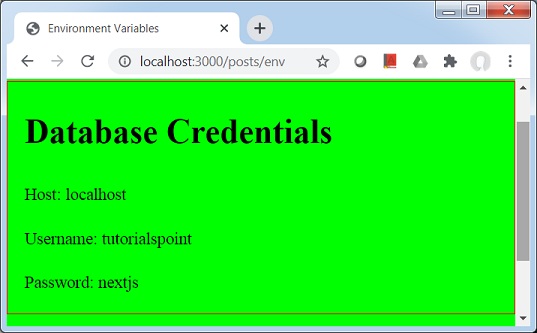📌 相关文章
- Next.js 环境变量(1)
- Next.js-环境变量(1)
- Next.js 环境变量
- js 环境变量 - Javascript (1)
- js 环境变量 - Javascript 代码示例
- r 环境变量 (1)
- c# 环境变量 - C# (1)
- Next.js 安装(1)
- Next.js 安装
- Next.js-元数据(1)
- Next.js-元数据
- Python中的环境变量
- Python中的环境变量(1)
- c# 环境变量 - C# 代码示例
- 什么是 next.js - Javascript (1)
- Next.js-页面
- Next.js-页面(1)
- Python next()
- Python next()(1)
- Next.js教程(1)
- Next.js教程
- c++ 获取环境变量 - C++ (1)
- 什么是 next.js - Javascript 代码示例
- 讨论Next.js(1)
- 讨论Next.js
- .next() 方法 (1)
- Next.js-概述(1)
- Next.js-概述
- Next.js-CLI
📜 Next.js-环境变量
📅 最后修改于: 2020-10-22 06:48:48 🧑 作者: Mango
Next.js支持在节点中发布环境变量,我们可以将其用于连接服务器,数据库等。为此,我们需要在根目录中创建.env.local文件。我们还可以创建.env.production。
创建.env.local
使用以下内容在根目录中创建.env.local。
DB_HOST=localhost
DB_USER=tutorialspoint
DB_PASS=nextjs
创建env.js
在pages / posts目录中创建一个名为env.js的页面,其中包含以下内容:我们将使用process.env使用环境变量。
import Head from 'next/head'
import Container from '../../components/container'
export default function FirstPost(props) {
return (
<>
Environment Variables
Database Credentials
Host: {props.host}
Username: {props.username}
Password: {props.password}
>
)
}
export async function getStaticProps() {
// Connect to Database using DB properties
return {
props: {
host: process.env.DB_HOST,
username: process.env.DB_USER,
password: process.env.DB_PASS
}
}
}
现在启动服务器。
Next.JS将检测到.env.local并在控制台上显示以下消息。
npm run dev
> nextjs@1.0.0 dev D:\Node\nextjs
> next
ready - started server on http://localhost:3000
info - Loaded env from D:\Node\nextjs\.env.local
event - compiled successfully
wait - compiling...
event - compiled successfully
event - build page: /posts/env
wait - compiling...
event - compiled successfully
验证输出
在浏览器中打开localhost:3000 / posts / env,您将看到以下输出。
